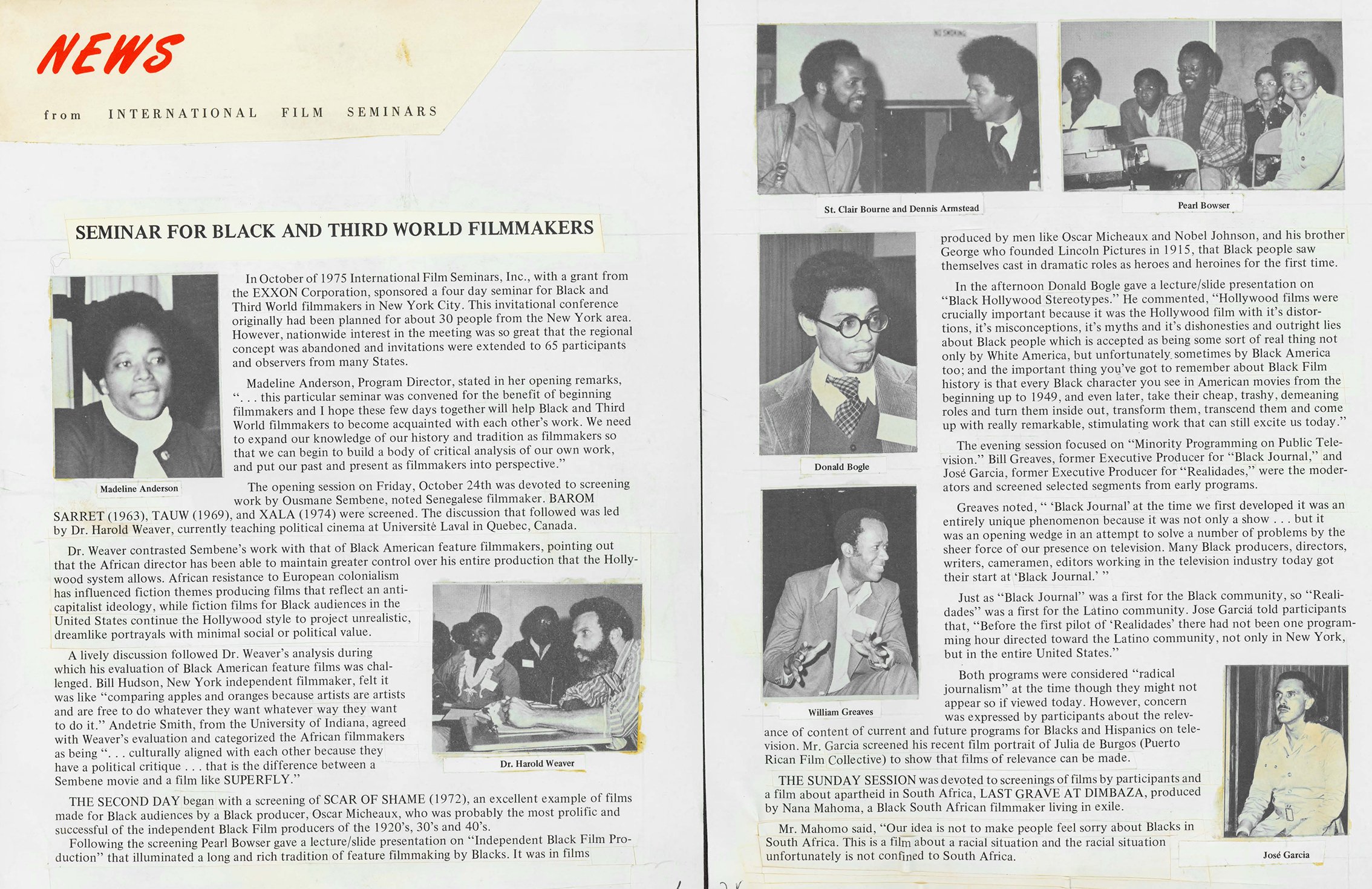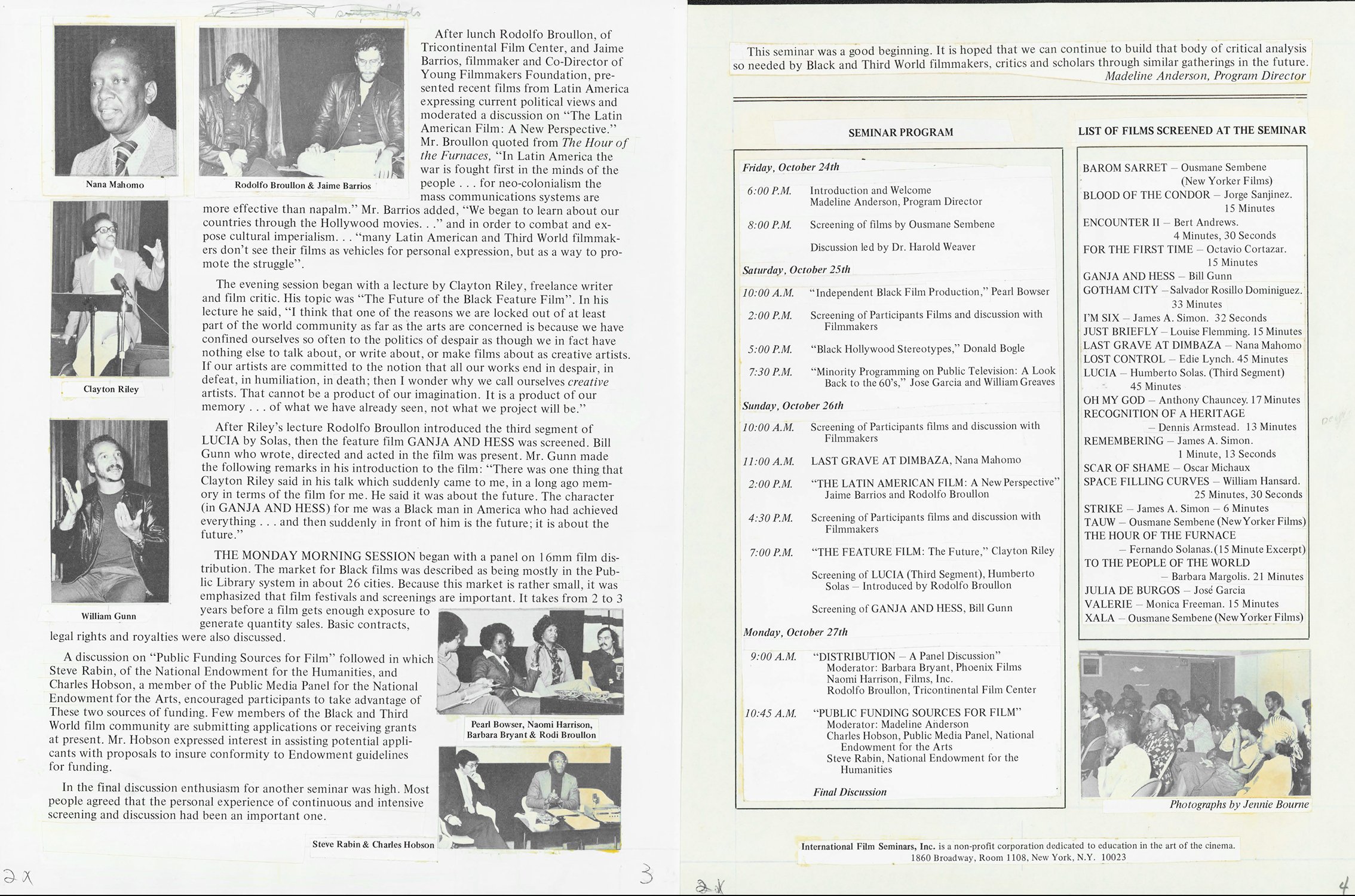PAGE CONTENTS
Patty Zimmermann 1955-2023
Pearl Bowser 1931–2023
Phil Wilde
OCTOBER 2023
Many Generations Mourn the Loss of the Great Pearl Bowser
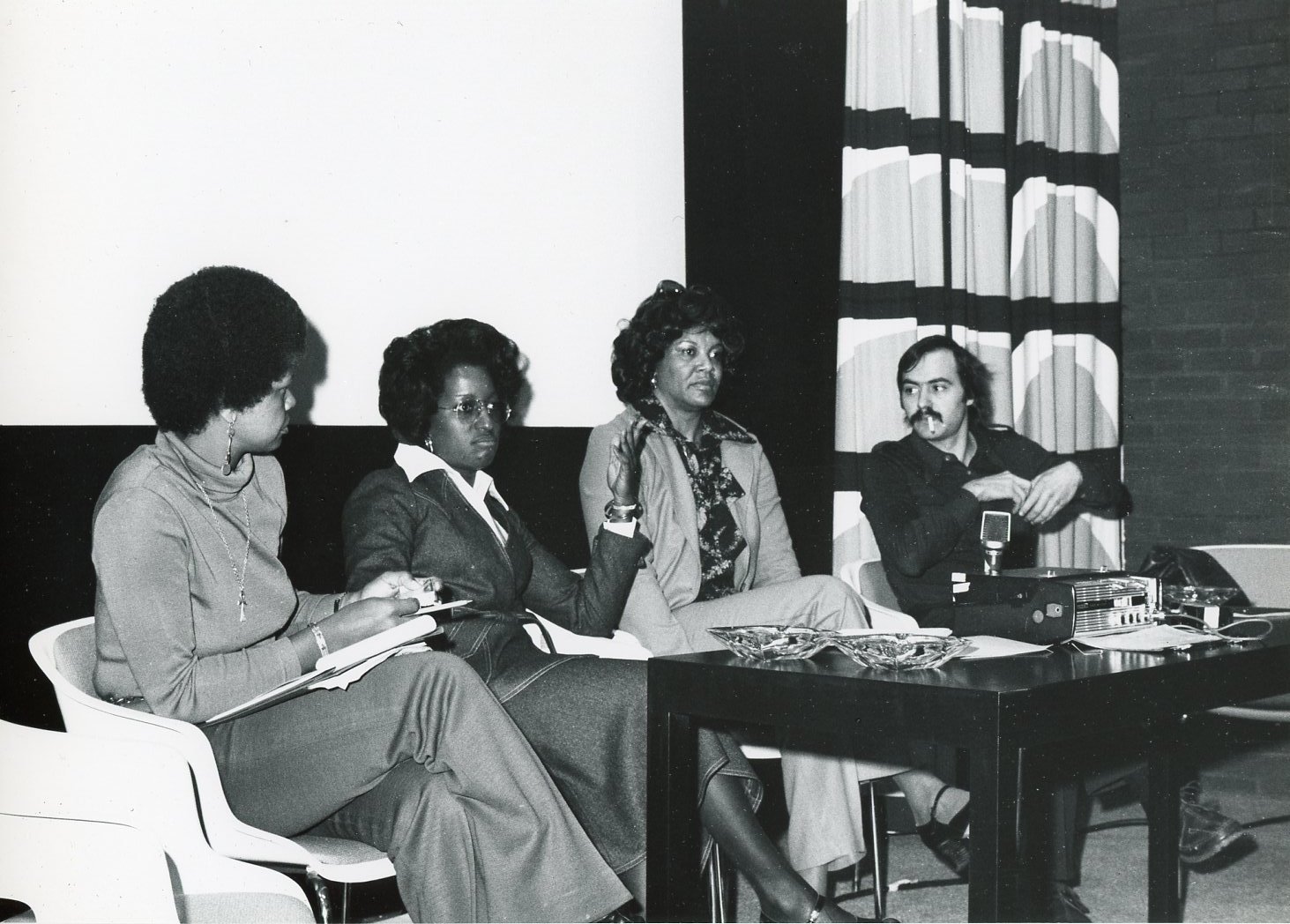
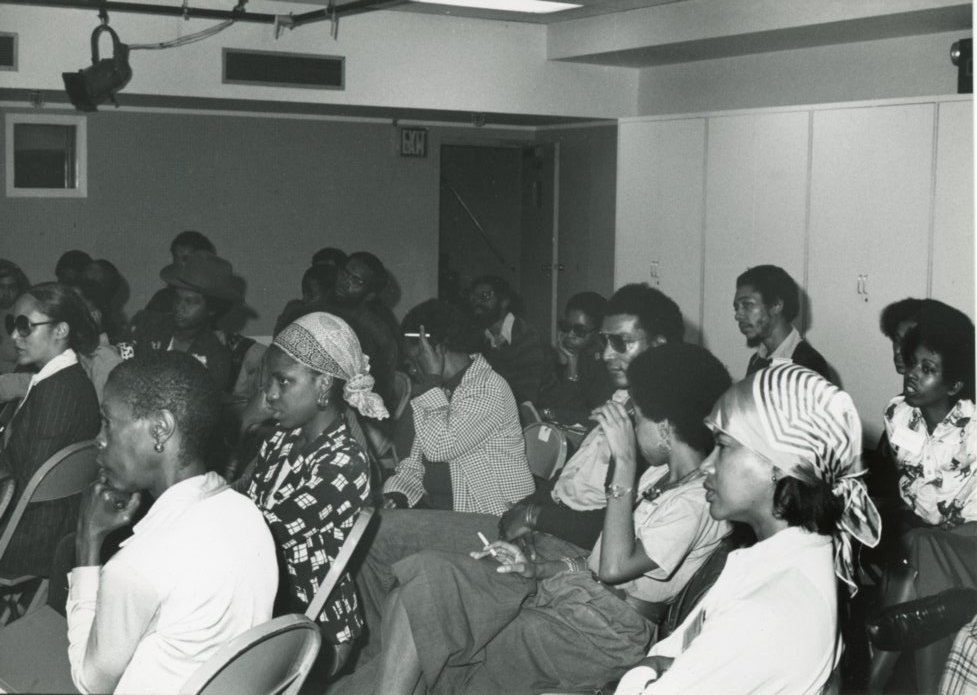
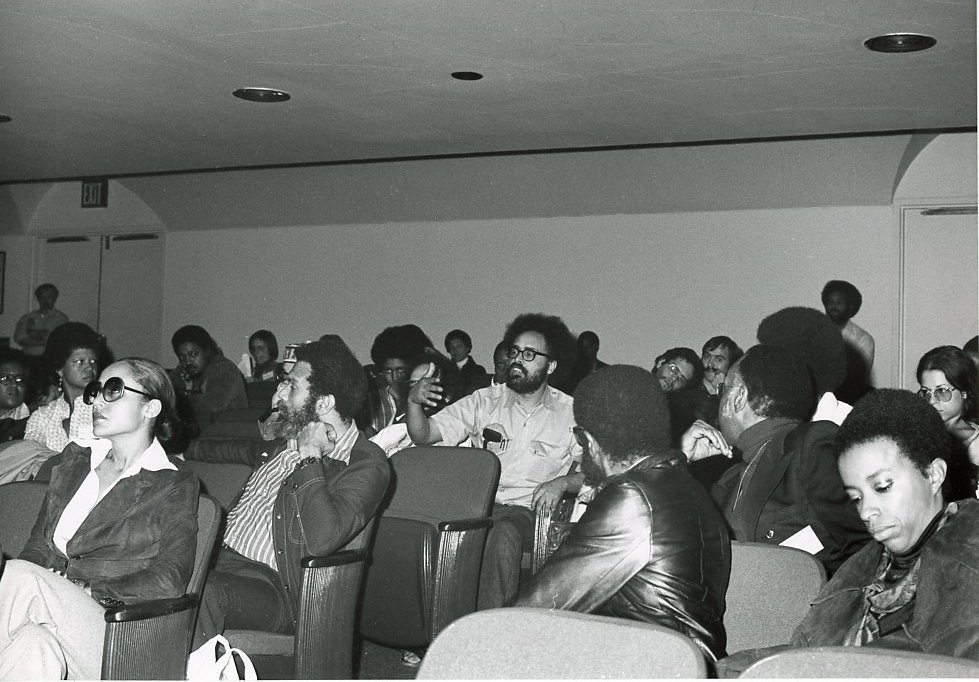
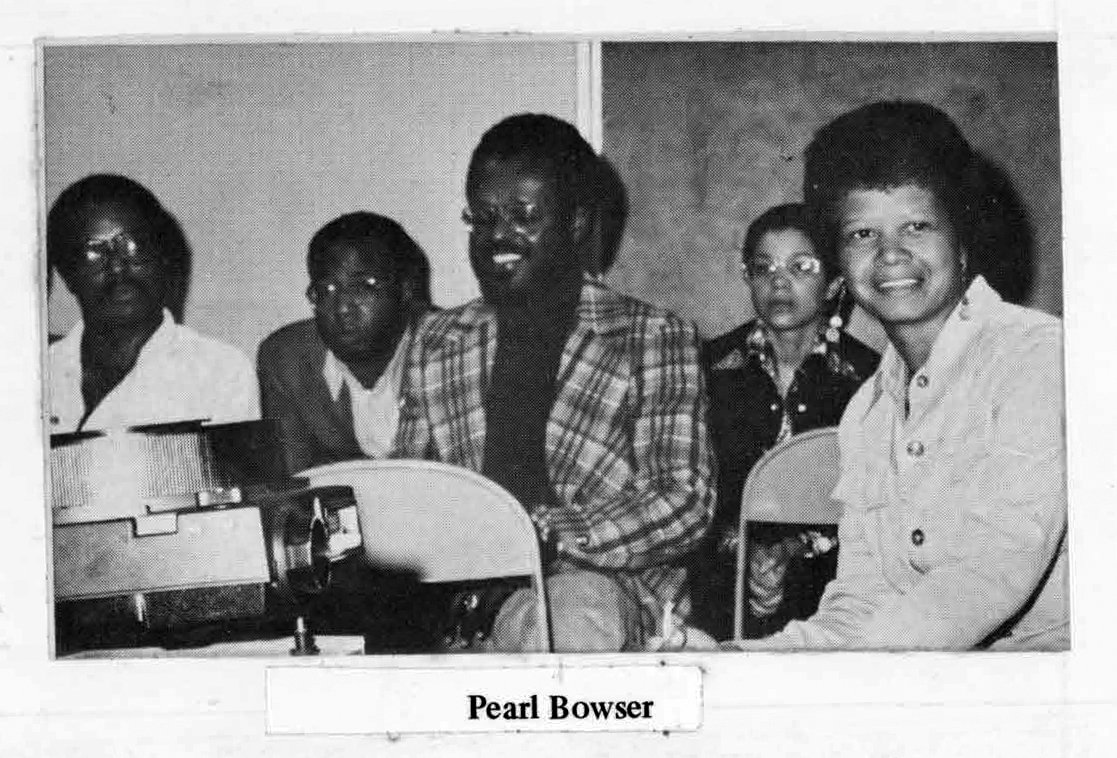
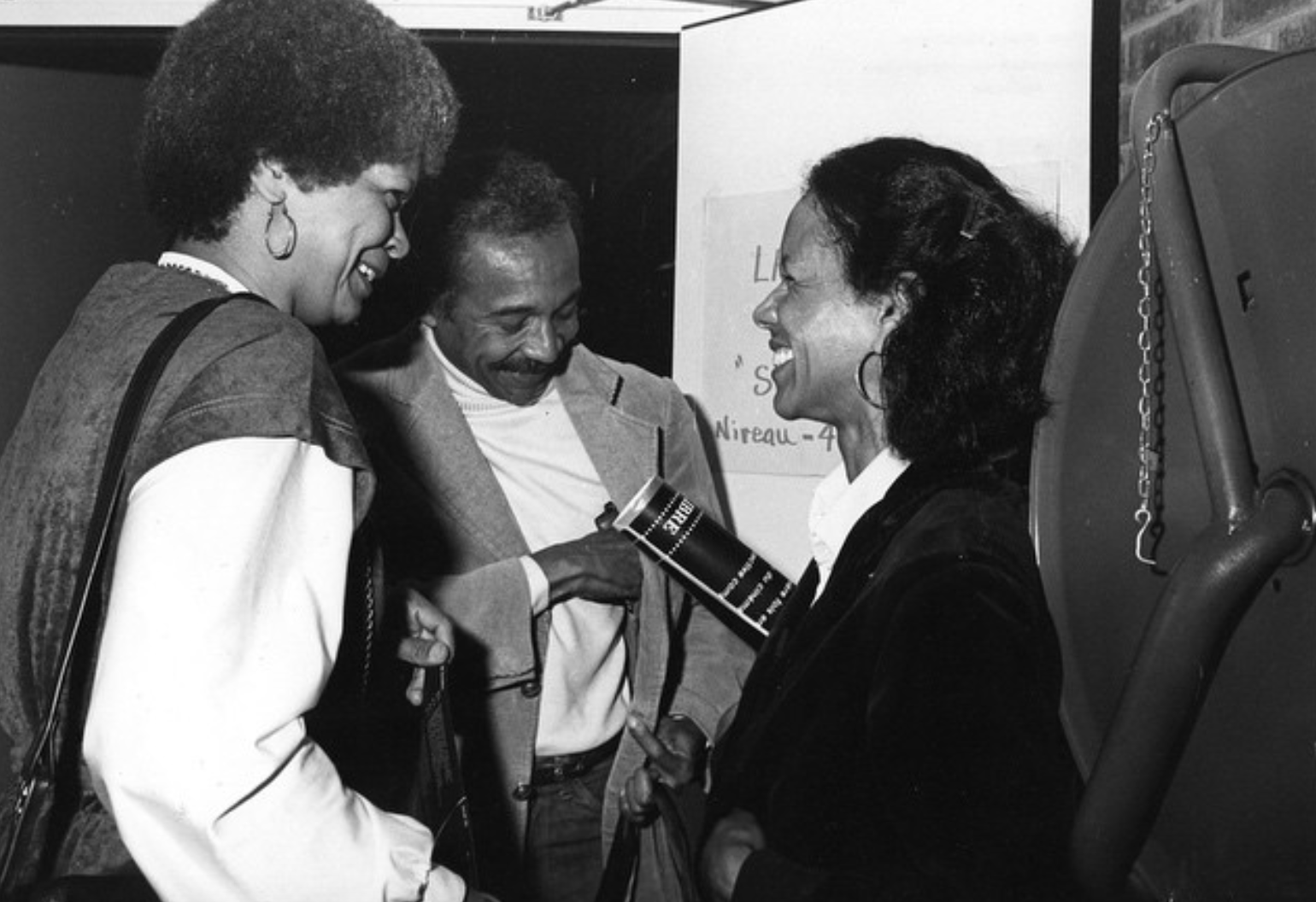
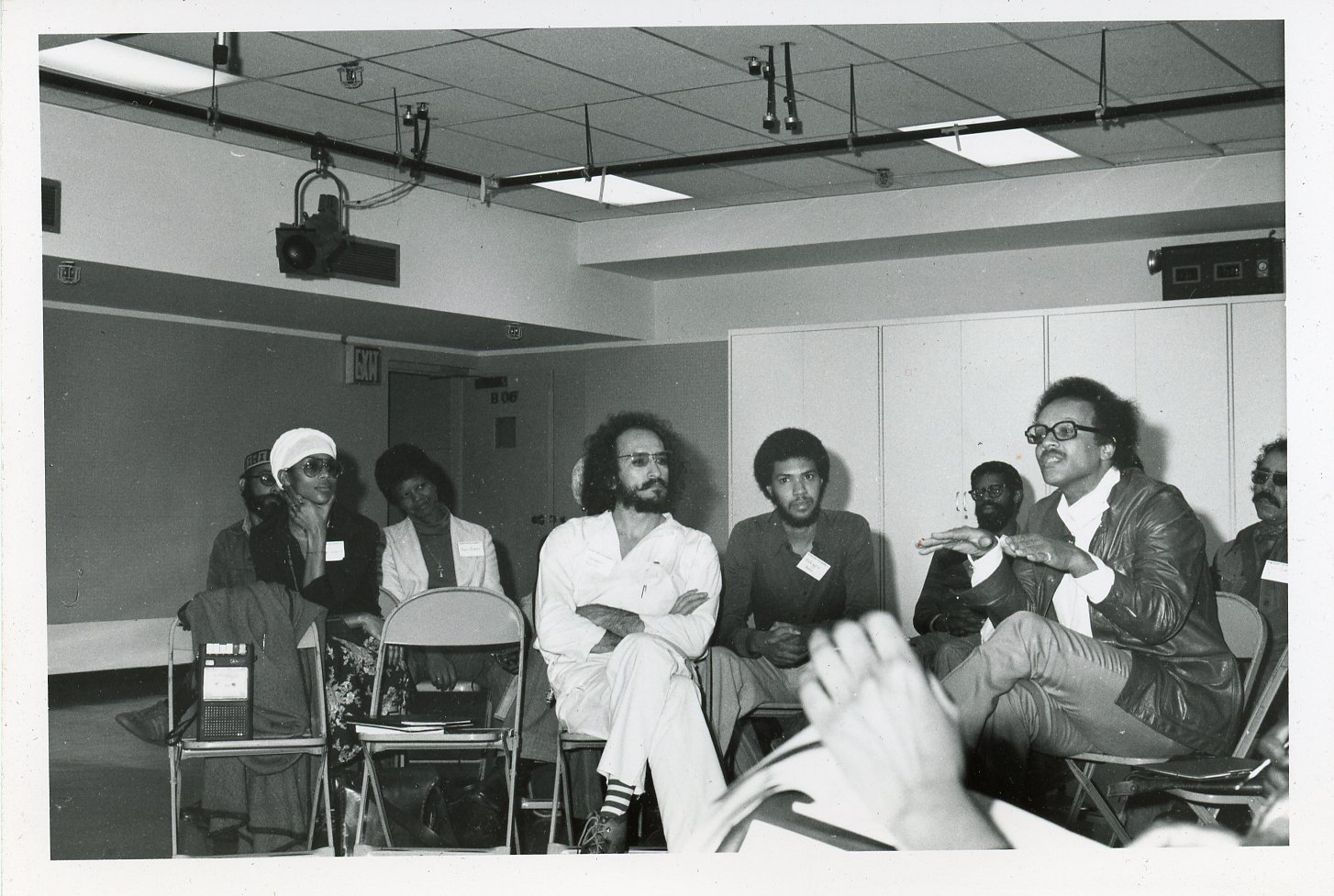
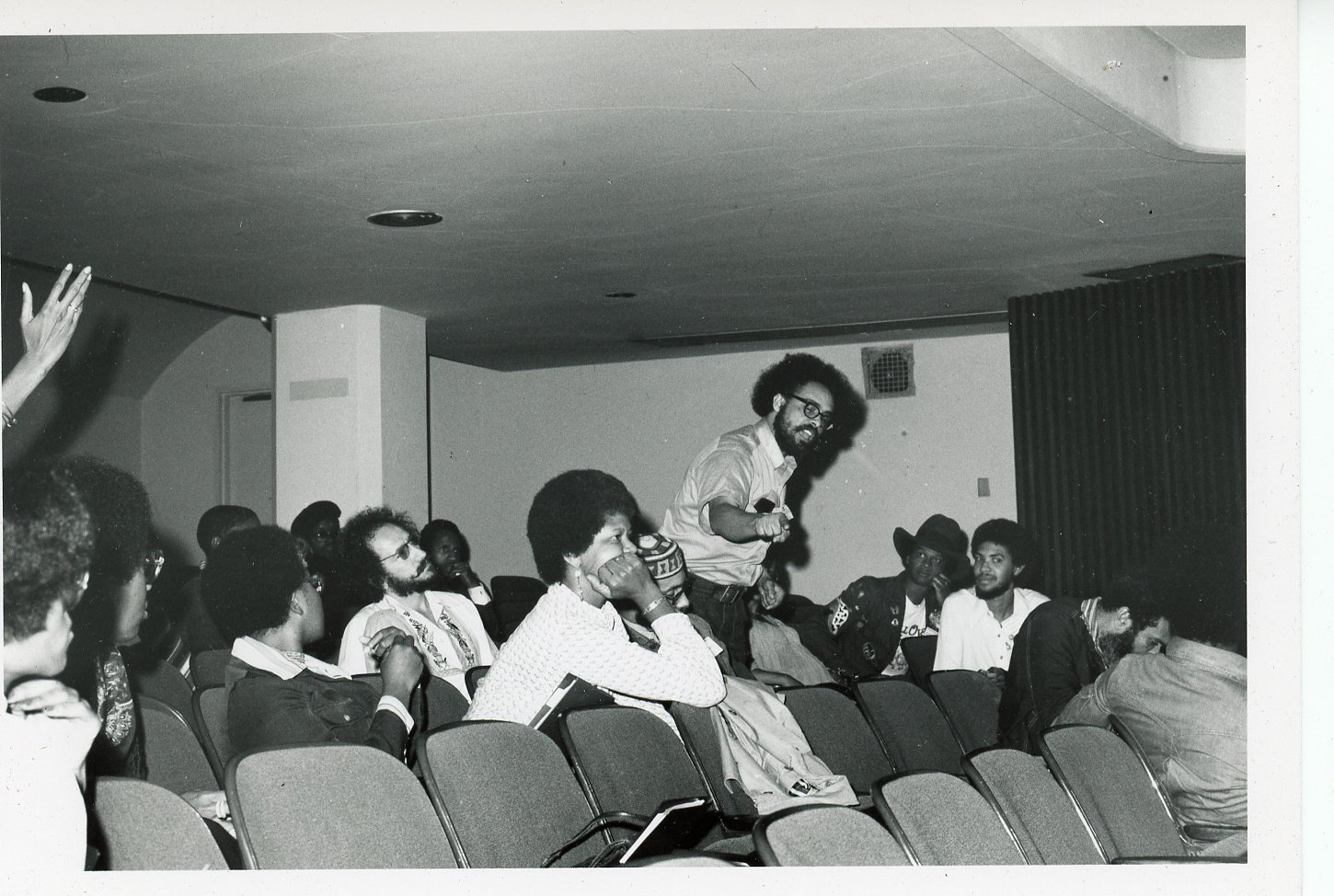
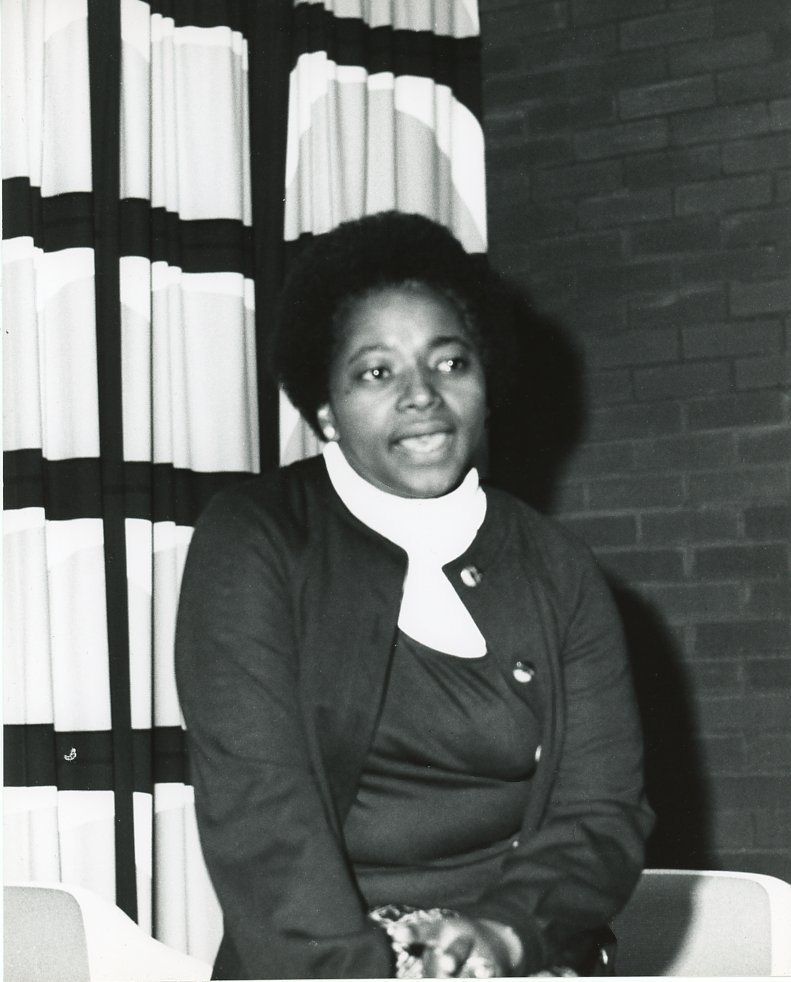
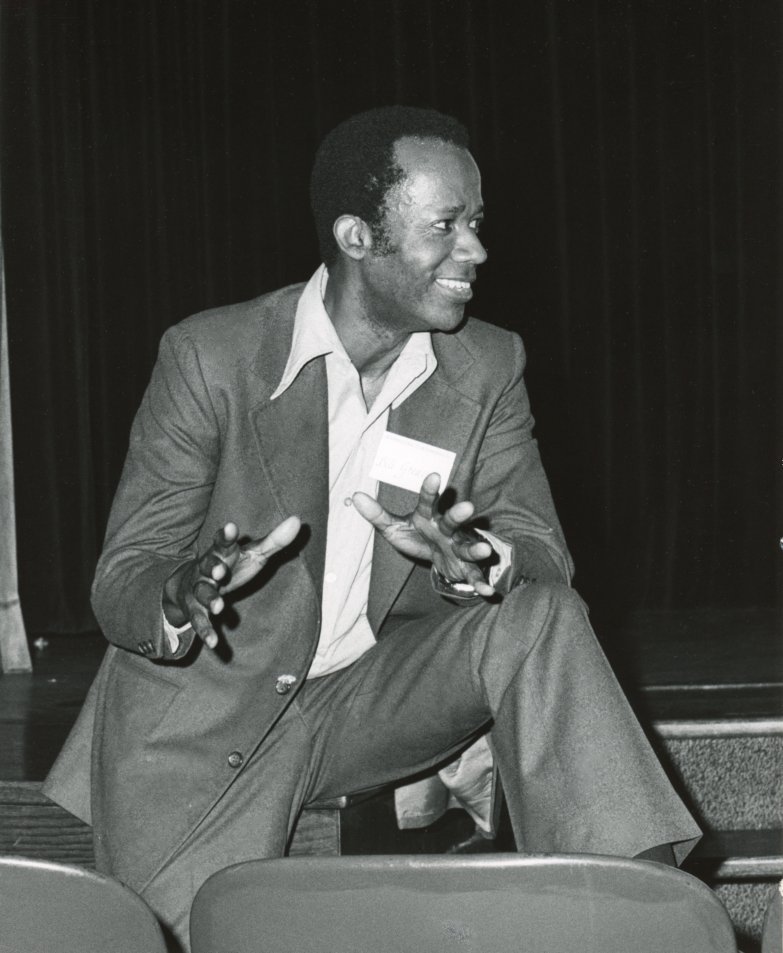
The Flaherty Black and Third World Filmmakers Mini-Seminar, photographed by Jennie Bourne. October 25 1975. Photos feature Pearl Bowser, Madeline Anderson, William Greaves, and group shots of discussions that went late into the night.
We mourn the loss of Pearl Bowser, a tremendous figure in Black independent film, researching, chronicling, exhibiting, and promoting. A celebrated film scholar, author, archivist, educator, activist, filmmaker, and independent distributor, Pearl Bowser was a stalwart champion of independent film and filmmakers of color until her passing last month at the age of 92. She has spent her multifaceted career collaborating with other filmmakers and scholars and cultivating audiences for marginalized voices in motion pictures.
Pearl Bowser has been rightfully honored as the “Godmother of Black Independent Cinema,” the pioneer who brought the work and life of trailblazing filmmaker Oscar Micheaux and other Black filmmakers to the public eye. Since the early 1970s, she organized and curated many landmark exhibitions and programs featuring Black films and filmmakers, igniting a new wave of enduring interest in exhibiting, producing, and engaging with African-American cinema beyond borders.
Alongside Madeline Anderson, Program Director of International Films Seminars, Inc. (aka The Flaherty) and Coordinator Barbara van Dyke, Pearl Bowser organized the 1975 Flaherty Black and Third World Filmmakers Mini-Seminar, a historic gathering of filmmakers of color in New York City to share their works with each other. In her opening remarks, Madeline Anderson stated: “I hope these few days together will help Black and Third World filmmakers to become acquainted with each other's work. We need to expand our knowledge of our history and tradition as filmmakers so that we can begin to build a body of critical analysis of our own work and put our past and present as filmmakers into perspective.”
Bowser worked closely with The Flaherty for over fifteen years, as President (1986-1989) and as Programmer of the groundbreaking 35th Flaherty Film Seminar 1989. From Patricia R. Zimmermann (rest in peace) and Scott MacDonald’s The Flaherty: Decades in the Cause of Independent Cinema (2017):
In 1989, Pearl Bowser and Grant Munro mounted a seminar with an explicit focus on Third Cinema (African, African American, African diaspora, Asian American, and Latin American work) that signaled an important intervention into the mostly white, male, and East Coast North American Flaherty seminars of decades past.
This seminar featured the works of American filmmakers of color who were to become important figures in independent film history: Ayoka Chenzira, Julie Dash, Henry Hampton, Louis Massiah, Jacqueline Shearer, and Orlando Bagwell (with episodes of the monumental PBS multipart series on the civil rights movement, Eyes on the Prize); Philip Mallory Jones, and Trinh T. Minh-ha. Lynne Sachs, a white feminist filmmaker, showed Sermons and Sacred Pictures (1989). For the first time in the seminar's history, the programming featured many works from Africa and Latin America, including Olley Maruma (Zimbabwe), Check Oumar Sissoko (Mali), Gaston Kaboré (Burkina Faso), and Oliver Schmitz (South Africa). John Akomfrah and Pratibha Parmar also attended.
As Bowser explained, "The seminar's theme of third world cultures and histories attracted African and African diaspora filmmakers, programmers, and educators in record numbers (perhaps the largest gathering at a Flaherty Seminar any of us could remember)." This seminar was exceptional and significant in the history of the seminar. Its programming created a platform for producers of color and for discussions about racial identities and politics across Africa, the Caribbean, England, France, Latin America, and the United States. (p. 156)
Louis Massiah worked on Eyes on the Prize and founded the Scribe Video Center in Philadelphia. For him, this seminar ushered in a necessary change to the Flaherty. The questions of race had been simmering at the Flaherty Seminar for over a decade. Massiah contended that the two "most positive transformative agents in the recent history of Flaherty have been Pearl Bowser and B. Ruby Rich." He argued that Pearl Bowser organized filmmakers of color to "share in the seminar's critique and expand the discourse" in order to work for diversity in discussions, governance, and programming that would add "creative synergy" to IFS as a media arts organization and the Flaherty as a retreat to refuel those in the independent media sectors. (p. 158)
While accomplishing all this, Bowser was the director of the Theater Project at Third World Newsreel, went on to direct her own film, MIDNIGHT RAMBLE (1994), founded Chamba Educational Film Services, a distribution company, and African Diaspora Images, a visual and oral history collection of African-American filmmaking.
Pearl Bowser will long be remembered for her persistence in forging connections and collaborations beyond the dominant imaginations of her time.
___
References:
Patricia R. Zimmermann (rest in peace) and Scott MacDonald, The Flaherty: Decades in the Cause of Independent Cinema (2017)
Special Program: Tribute to Pearl Bowser (Film at Lincoln Center, 2022)
Third World Newsreel Mourns the Recent Passing of Pearl Bowser (1931–2023)
Pearl created an engaged and intellectually rigorous community
In 1989, Pearl Bowser was the programmer of the Flaherty Film Seminar. She invited me to be an artist at the seminar and to screen my film Sermons and Sacred Pictures: The Life and Work of Reverend L.O. Taylor. Reverend Taylor was a filmmaker who shot from the inside out, a Black minister documenting his own Memphis community with his own Bolex 16mm camera and his own audio recording device. Of course, I was grateful to be part of the seminar with its focus on African Diaspora filmmakers. Over that week, Pearl subtly but emphatically created an engaged, intellectually rigorous community around the films and filmmakers that she had chosen to present. She invited author and filmmaker Toni Cade Bambara to instigate conversations after the films, to take us as a group into a truly metaphysical dialogue on cinema. Pearl also asked film scholar and theorist Teshome Gabriel to facilitate some of the conversations. Twenty-seven years old at the time, I was grateful for his encouragement and guidance.
I remained in touch with Pearl over the years. Our last deep interaction happened in 2015 when film curator Josh Siegel programmed Sermons as part of his series Tributaries: Zora Neale Hurston and Other Chroniclers of the South at the Museum of Modern Art. Pearl and I made a date to go to a matinée together. What a joy it was for me to spend this time with her, in the light, of course, but just as much in the dark of the theater. For those of us with a passion for the moving image, these shared hours without words allow us to feel another kind of connection to each other and to the beyond.
Lynne Sachs
Love to Phil Wilde
In this season of multiple losses, we also mourn the passing of Phil Wilde. Phil was vice president and co-owner of Insights International, and a filmmaker with his partner Ann Michel. Ann and Phil brought video to the seminar in 1984 and remained stalwart participants and tech support leads for decades. Each also joined the Board, and Ann served as President from 2009-2012.
Phil embodied the big, open-hearted spirit of The Flaherty. Every Seminar I ever attended with him, he was quick to approach first time participants to greet them with a warm hello and a “Tell me about yourself!” He was especially interested in folks who traveled long distances to join us and loved to travel himself. Phil will be dearly missed.
Jason Livingston
SEPTEMBER 2023
Onward, Patty Zimmermann!
Photographs of Patty Zimmermann at the 1994 Flaherty Film Seminar; contact sheet
After the 1990 Flaherty Seminar in Riga, Patty, her husband Stewart Auyash, Marlon Riggs, and I posed with Matryoshka dolls we had brought back.
As exciting as the rowboat?
I owe my entire career as a film programmer to Patty getting me a job directing Cornell Cinema in 1982. She lobbied the search committee relentlessly, and they had no choice but to hire me. She pulled me into the orbit of the Flaherty Seminar, and we collaborated frequently on the Flaherty Board of Directors and on special events like the 1990 Seminar in Riga, Latvia and the 50th Anniversary program at Vassar College in 2004.
Patty and I met 46 years ago when we were first-year graduate students in Communication Arts at University of Wisconsin-Madison. I had never met anyone like Patty. She was funny, brilliant, radical, and utterly dazzling. As close friends, we were explosive together. We never stopped talking and arguing and debating and laughing our heads off. To make some extra money, both of us were part-time projectionists for film classes at UW. I’d sit in the projection booth with her when she was projecting, and she would sit in with me. David Bordwell, the big shot film professor at UW, would frequently step into the booth and ask us to shut up.
When I think of my relationship with Patty in the early years of our friendship, I always think of the rowboat we took out on a lake in the Adirondacks during the 1983 Flaherty Seminar. Patty and I had gotten worked up by a film, although I can barely remember why. We both tore into the film during the discussion and then immediately got into the rowboat. Patty was still fuming and was paddling furiously, so much so that I thought we might go overboard. For decades after this, we could crack each other up by asking, if one of us mentioned an exciting experience: “As exciting as the rowboat?”
The shock of her sudden, early death has felt like tipping over. But attending her powerful burial service (music and poetry, I was told, programmed by Patty), witnessing the moving testimonials by faculty and administrators during the Ithaca College live-streamed memorial, and reading the cascade of reminiscences by students and colleagues on social media has almost righted me. I’m grateful for having been a part of her well-lived life.
Richard Herskowitz, Past Board president (1993-95), Programmer (1987, 1990 Riga, 1999), Chair of 50th Anniversary Committee (2004)
Patty was a beacon and a shout.
I don’t often find myself speechless, but I have felt a veil of numbness and disbelief ever since seeing a notice of Patty Zimmermann’s death last week. It feels hard to confront this reality by putting words on paper. Patty touched my life in a number of ways over the years. Patty was a beacon and a shout. Her brilliance and courage showed me a view of the academy that I had not seen before. Her passion for media theory and its concerns was an index of her larger passion for humanity.
I first encountered Patty when we were both on a New York State Council on the Arts (NYSCA), Media panel in the mid 1980’s. I was taken then by her energy and her intelligence. I loved that she was so smart, and willing to defend our teaching of experimental film and cutting edge documentary work that was pushing formal boundaries and exposing issues that came out of the civil rights and women’s movements. She had an intelligence and an edge that reflected a sharp, smart, and critical attitude that I had seen in others from the graduate Communication Arts program at the University of Wisconsin, Madison, during the 70s.
Patty’s inspirational leadership was instrumental in the founding of the Central New York Programmer’s Group. Patty (from Ithaca College) and Scott MacDonald (from Utica College) came to Colgate where I was teaching for an initial gathering of media programmers from the greater Central, Western, and Southern Tier areas of New York State to discuss ways that we could work together. The object was to bring filmmakers to our programs that we, as individual institutions, could not afford to do alone. The result was major NYSCA support for additional funding for visiting artists and the salary of a part-time coordinator on the Cornell campus in Ithaca. The CNYPG continued for twenty, years until 2006.
It was Patty’s idea that the Flaherty Film Seminar should move to Colgate. Patty had seen its newly completed Golden Auditorium Cinema and Clifford Art Gallery, and saw the possibilities for the Flaherty. She approached me with the idea. I approached the Flaherty and the rest is history. I tell the story in detail in Patty and Scott’s book Flash Flaherty. This gesture demonstrates, once again, Patty’s devotion to building community.
Finally, I am grateful to Patty for supporting and screening my work around the world, including in Singapore. Many years ago, I sat in on a session about found footage at a media conference at the Northeast Film Archive, in Maine. I walked into a screening room and Patty Zimmerman was on stage talking about one of my early collage videos. I didn’t know that she was going to be there or that she was going to talk about my work.
Patty Zimmermann was a wonderful colleague, scholar, teacher, and friend. She will be missed and remembered by many who were touched by her.
John Knecht, Russell Colgate Distinguished, University Professor of Art and Art History and Film and Media Studies. Emeritus.
Moscow Road, August 31, 2023
A provocateur, an intellectual, an activist.
Patty was a dear colleague, a mentor, and an ally. I met her at the Opening Night of the 50th Flaherty Seminar in 2004, and a year later I had the opportunity to hang out with her at the Morelia Film Festival in Mexico. Since then, we developed a close relationship, and she played a big role in my programming the Seminar in 2007 along with Mahen Bonetti.
Patty was generous, she offered insightful professional advice, and always had good gossip. In addition to the Flaherty experiences, she was kind enough to invite me to the Finger Lakes Environmental Film Festival family, where I was able to see her most in her element.
A provocateur, a true intellectual, and an activist, she certainly leaves a big academic and professional legacy. I hope we can all honor it by carrying forward her passion.
Carlos Gutiérrez, 2007 Seminar Co-Programmer
ONWARD
I'd like to share this small hand-written note Patty (and Scott) sent me when they were editing the collective Flash Flaherty volume. Probably the last contact I had with her. Onward.
Josetxo Cerdan Los Arcos, 2010 & 2011 Seminar Participant, 2012 Seminar Programmer
Patty and Helen at the Madres de Plaza de Mayo in Buenos Aires during the Visible Evidence Conference, 2018.
A sparkler. A synthesizer. An enactivist.
Since 1987, when we met at a Flaherty Seminar, I’ve been on a collaborative and co-creative adventure with my dear friend and sister in solidarity, Patty Zimmermann. I will always see her, not only as a media historian and theorist, but as a creator playing on a variety of platforms —from social media to her famous hand notes, from lecturing to our global convenings on Zoom, from the FLEFF festival to books, performances, articles, and online journalism. Her desire to expand media as a free-range environment for the imagination and all its possibilities knew few constraints.
There are three images where her energy and spirit live on for me and, I hope, for all of us connected through the Flaherty Seminar:
Patty. The Fourth of July Sparkler—incandescent, burning brightly, sending out sparks and lighting up everyone who comes into contact with you. Your sizzling flares would ignite new ideas, connections, and explorations. Your appetite for new places and people was loads of fun, bringing all kinds of folks together to spark new relationships, and support one another in new and completely surprising ways.
Patty. The Master Synthesizer. With your background in journalism and skill for deep listening, you would hear and combine multiple parts of conversations, thoughts, and feelings that no one else picked up. You could put your own ego aside to open up to the wonders of other people’s ideas, research and art. You would recognize them fully and generously. In our quarterly global Zoom convenings during the COVID years, we would tag team facilitating the conversations, so everyone involved had a chance to be heard. At the end, you would pull together all the pieces into a coherent narrative that was exciting, expansive, and important. I would leave the meeting feeling more empowered than I could have imagined during those dark months of pandemic and protest.
Patty. The Enactivist. You would practice what you valued the most -- traveling through life reaching out as an engaged participatory sense-maker. We were drawn together to make sense of co-creation, collaboration, and community building, both in our writings together and in our other convening projects together.
As I recall all your contributions to the larger drifts of film history, digital theory, and media democracy, I am still amazed by how fiercely you championed the media making of communities in small spaces, the media of the unresolved, and the local.
I know you understood that media built in small spaces could mean freedom – to imagine, experiment, and enact new connections with confidence and courage. And you wanted the world to know that this art practice had major significance far from the centers of corporate entertainment.
A sparkler. A synthesizer. An enactivist. Patty Zimmermann lives on in my heart, encouraging me always to reach out, make stuff with others, and always move from “me-to-we.”
Helen De Michiel, Co-authored OPEN SPACE NEW MEDIA DOCUMENTARY: A TOOLKIT FOR THEORY AND PRACTICE (2018) and several other articles and dossiers on documentary and co-creation with Patty Zimmermann.
A tribute to Patty Zimmermann, my beloved friend and mentor.
I can hear Patty’s voice right now and I bet you can too: that warm emphasis and enthusiastic twang, the infectious sound of her smile. We know Patty was brilliant and always one of the first to notice changes in our field; for example, giving close attention to every new iteration of digital media and bringing to it the most politically astute analysis; noticing subtle currents in transnational independent cinema; embracing environmentalism early; famously, taking amateur movies seriously as archival cinema.
But Patty was at ease in her brilliance. She had not a shred of snobbism or elitism or mean-spiritedness, and that generosity surrounded her with loving, trusting, and grateful friends. When Patty became your friend you had a friend for life. A solid ally, constant in her support; generous, honest, stalwart, trustworthy, and fun. Patty was one of the very first people who took me seriously as an intellectual when I was a green young graduate student. She invited me to give a talk at Ithaca College in 2000, and she and Stewart (as warm and kind as she) put me up in their beautiful home in the woods and fed me a delicious meal. Later, Patty was like a secret fifth member of my doctoral committee, giving me the best advice and consistent feedback.
Patty was a fighter, in a spirit not of judgement but of love: she fought not against what’s judged to be bad but for what is and generative and live-giving. I am so grateful for her life advice and her vigorous sympathy. Like the time I was devastated from a broken heart, Patty and Stewart took me in and fed me and took care of me and she denounced the heartbreaker in no uncertain terms.
Patty taught me how the Flaherty works, taking me under her wing from the first time I attended the seminar in 1991. She explained Frances Flaherty’s principle of non-preconception and was a model of Flaherty’s ideal attentive, open-minded audience member. When I railed against Flaherty attendees’ seeming mania for correct representation, Patty wisely and compassionately diagnosed their response as a symptom of economic precarity. And when I programmed the Flaherty myself, she encouraged me to plan carefully and then (with that gorgeous, infectious big smile), at the Flaherty itself, to let go control, stay in the background, remain as calm as a Buddhist monk, and allow events to unfold. It’s thanks to Patty that I stayed so calm while bewildered, angry audiences regarding my programming choices, let the storm wash over me, and enjoyed the sunny morning at the end of the week when things fell into place in a way I could not have foretold. “Trust the process,” Patty said.
Patty was no ascetic. She filled her life and ours with beauty and music and delicious food and sensuous pleasures. When times were rough, she embraced deep enjoyment. Patty always advised me to rise above. But to rise above the problems that dog you, you have to be well grounded, know yourself, and be kind to yourself. It takes a big soul. So as I grieve along with so many others, I will gratefully try to become ever more Patty-like, and so to keep her alive in my heart and my life and those of others.
Laura U. Marks, 2015 Seminar Programmer
Dear Patty,
Where are you? How could you have left us? You went away so quickly! You were such an important, vital, energetic, confusing, academic, literate, articulate, scholarly, and forceful voice of film knowledge in our Flaherty discussions. You would stand up and we would say, “Oh boy, here she goes…” but all of us would be riveted by the pace and complexity of the delivery and analysis of the films we had just seen. Or the intractable weaving of themes as we moved through the week—but it was like opening a piñata. It inspired argument and counter-argument, got blood boiling, people thinking, or just sitting in a daze! It was quintessential Flaherty… essential Flaherty! I think we need you now more than ever! And the wonderful contribution of the books, Flash Flaherty and the earlier one with Scott. I even saw them at the book tables in Bologna! Thank you so much for your energy and insights over all these wonderful years of our dear Flaherty Film Seminar. You will be sorely missed!
Love, Linda Lilienfeld
Unbounded energy and piercing insight
Patty Zimmermann worked intensely with Scott MacDonald on Flash Flaherty: Tales from a Film Seminar (2021). Like so many others, I knew Patty in a public context in the different film environments where she found community and meaning. I witnessed her unbounded energy and piercing insight. For this memorial recognition, I write about the time in which she was particularly supportive of me when I was dealing with an issue with my text in the Flaherty book.
As we all know, the Seminar brings out emotions and reflections, but hindsight offers us deep and complex ways to think about the work we’ve made, and its effects on others. I was invited to present my film Sermons and Sacred Pictures: the Life and Work of Rev. L.O. Taylor at the Flaherty in 1989. Thirty years later, Patty asked me to revisit the experience for the book. Another Seminar participant wrote about her own memories of the screening. She shared her perspective in her piercing and candid reflection. When I read it, I felt very sad… breathless. But it also gave me the ability to witness her distinct perspective. Patty assisted both of us in working through our interpretations of our distinct memories. She also encouraged us to connect directly as artists, which we did. Here is what Patty wrote to me:
“Tell me more about why you are breathless? I think [the writer] shifts the issue away from you a bit? Don't feel constrained about writing a comment. My suggestion would be to do it as a question or an invitation to more dialogue? Let me know. When we read (the other text), Scott and I realized we needed to have you in this book. Let me know your thoughts. So sorry you found it so intense but tell me more. Maybe something to tap into for your piece?”
Patty pushed me to be forthright and vulnerable in my writing. She wanted Flash Flaherty to articulate the ways that we as makers connect to our work and the impact it can have on others.
Her imprint on me will remain, as it will for those who knew her intimately and those who simply benefited from her profound impact in our field, in the US and beyond.
Lynne Sachs
A brilliant scholar, a force for goodness, and an unforgettable person
I am shocked to learn of the death of Patricia R. Zimmermann, and will miss her always. She was a brilliant scholar, a force for goodness, and an unforgettable person. It was awesome to witness her contributions to the Flaherty Film Seminar. Year after year, during post-screening discussions, she spoke about the meaning of films with clarity and passion, helping to make the Seminar a riveting and extraordinary experience. As an innovative member of the Board of Trustees, 2005-2010, she helped the organization overcome major obstacles and thrive. With co-author Scott MacDonald, she wrote two books about the Seminar: The Flaherty: Decades in the Cause of Independent Cinema (2017) and Flash Flaherty: Tales from a Film Seminar (2021). These remarkable books have been acquired by more than 1,300 universities and public libraries in Switzerland, Sweden, Germany, Netherlands, France, Spain, United Kingdom, Australia, Singapore, China, Taiwan, Botswana, United Arab Emirates, Cyprus, Turkey, Greece, New Zealand, Mexico, Brazil, United States, and Canada. As a result, Patty’s creativity and bold intellect will continue to enrich peoples’ lives in every region of the world.
Steven Montgomery, Flaherty Board of Trustees, 2004-2010
On Sunday, September 17 at 8:30 am, there will be a Mass offered for Patty at Holy Cross Church on West 42nd Street in New York. As lector, it will be a privilege to lead the congregation in a prayer for Patty. May she rest in peace.
Miss New York, and Miss Everywhere Else
Patty was loved by so many people, including me. And aside from being so thoughtful and rigorous as a scholar, writer, programmer and teacher, she was also a lot of fun. One of my favorite times with her was at the Virginia Film Festival in 2007. We were at a party and she noticed that Miss Virginia was there and said we just *had* to get a picture with her. So we did.
As far as I was concerned, Patty was Miss New York, and Miss Everywhere Else that she went in her storied career. What a wonderful woman; what a loss.
Su Friedrich

